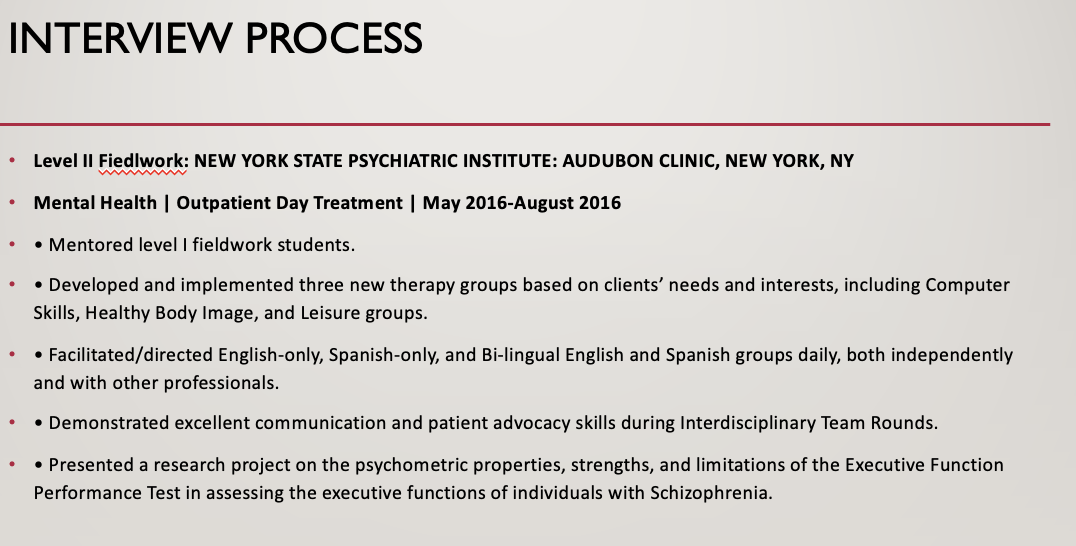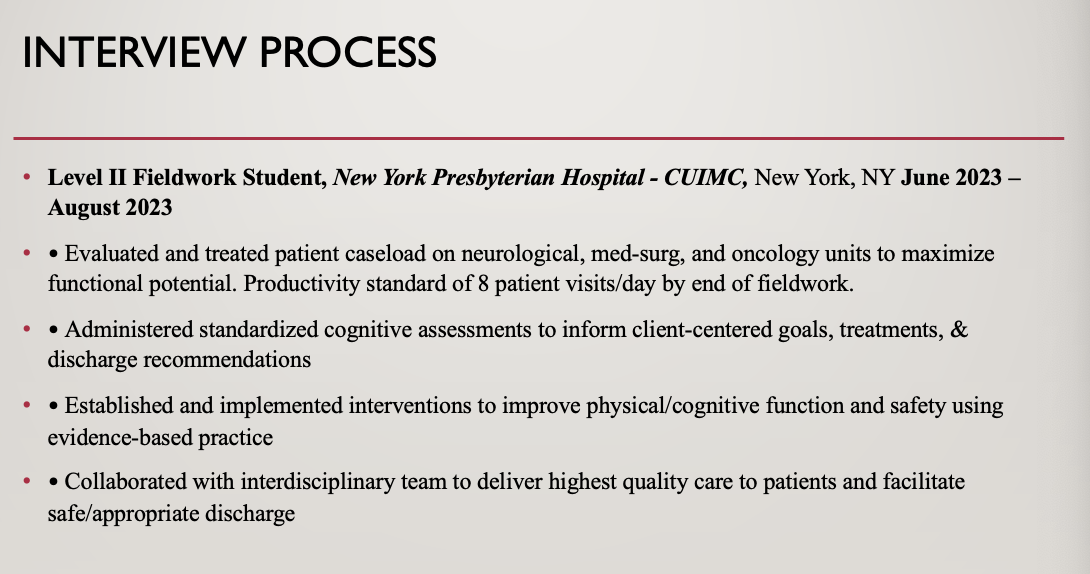What to Expect When Interviewing
1/15
There's no tags or description
Looks like no tags are added yet.
Name | Mastery | Learn | Test | Matching | Spaced | Call with Kai |
|---|
No analytics yet
Send a link to your students to track their progress
16 Terms
When seeking an interview for an OT position:
Do Your Homework!
Learn about the specific facility/organization, mission/philosophy/goals
What is unique about this place that catches your attention as a place for future employment? What client population(s) served? Programs? Approaches to client management? What settings do they work in?
Check social media/websites to learn what they’re engaged in, what’s important to them
Ask yourself, “Would I fit in and why?”; think specifics
Cover Letter
no more than one page
Introduction: who you are, recently graduated from Columbia University Programs in OT, etc.
How did you learned about the position…
Show your enthusiasm for the position…why you are suited for this position?
Brief overview highlighting your experiences, skills- summary of elements in the resume, but not a duplication of the resume
Promote yourself
Conclusion
Be careful to edit properly; if you are sending out cover letters to a few different places, make sure the letters appear individualized
Resume
attention to details matter
HR checks for accuracy!
Typical Sections:
Professional Summary/Objective
Education Experience
Clinical Experience
Work Experience
Licenses/Certifications
Awards/Recognitions
Professional Development
Professional Associations
Language Skills
Volunteer/Extracurricular/Interests
PROFESSIONAL SUMMARY (example)
“On my Occupational Therapy journey of 3 years, I’ve learned that I have a passion for working with underserved communities. I’m eager to learn new ways in which to help those in need and am seeking a job with mentorship to guide me into learning a new specialty or how to better address the needs of these specific patient populations. I’m flexible across different settings, and I enjoy helping others to explore meaningful activities that increase their quality of life.”
Interview Process: Objective
Objective
Newer OT: “To gain experience working cooperatively within an interdisciplinary team serving clients with varying disabilities to maximize functional independence.”
OT with experience:
“Experienced, hardworking, and highly motivated individual hoping to obtain a position in the field of OT to promote health and wellness, along with helping people become independent in their everyday lives. Transitioned from COTA/L to OTR/L to optimize knowledge in the field of occupational therapy. Interested in fast-paced environments with opportunities for clinical, educational, and professional growth.”
“To use my nearly 10 years of clinical experience, as well as the leadership and organization skills that I have developed as a Senior OT, to fulfill the role of Assistant Head of Occupational Therapy in Pediatrics at MS-CHONY.”
Clinical Experience
New Grads:
How do you describe your Behavioral Health Fieldwork II?
What would a future employer be most interested in?
Describe setting, what kind of team were you on, clients served, age range, roles and responsibilities, assessments/treatments, groups vs. individual treatment, special skills/projects, documentation, telehealth use…productivity?

How do you describe your additional Fieldwork II experiences?
What would a future employer be most interested in?
Describe setting, were you on a team, what kind of team, clients served, age range, roles and responsibilities, assessments/treatments, groups vs. individual treatment, special skills/projects, documentation, telehealth, productivity requirements
Can you demonstrate on your resume experiences to highlight skills compatible with Level II fieldwork or any other work/educational experiences you have had?
Examples of teamwork or individual work that would stand out

“Getting to Know You…”….you’re in an interview….
Does an applicant have the right “fit” for the place of work?
Mission of Organization…
Population Served & Specifics about the skill set..
“Fast-paced vs. slow-paced” environments…
Team vs. Individual Tx…
Schedule Requirements (Fulltime, Part-time, Days, Hours, Weekends, Holidays, what flexibility may or may not be built in)
look for and interview to the following:
Motivation- driven, ability to manage hard work, desire for growth and development
Skills & Knowledge- clinical experience
Emotional Intelligence- how they cope, persevere, relate to others…
Behaviorally-Based Interviewing
excellent method to provide examples of work behaviors
Attribute-based Interviewing focuses on specific behavior, i.e., problem-solving, conflict resolution
STAR: method of how to answer questions
Situation- describe the scenario and important details
Task- role/responsibility
Action- steps taken in this situation
Results- what were the outcomes achieved
Motivation
What motivates your best, most successful job performance? Can you provide an example of this motivation in action in the workplace?
How do you ensure that your personal level of motivation is high on a daily basis?
What do you see yourself doing 3 years from now…5 years from now?
Skills & Knowledge
Clinical scenarios
Describe patient/client experiences-types of diagnoses seen, settings trained/worked in…
What assessments, treatment planning, outcomes….
Describe what it was like working with clients, their families, S.O.s, other team members
Describe incorporating evidence-based practice into treatment
Emotional Intelligence-Consider How You Might Answer These Questions
Describe a stressful work situation you’ve had. How did you resolve that situation?
Describe a time when you received feedback about your performance and you disagreed with the feedback? How did you handle the situation?
Describe a time you had a disagreement with a team member and how you handled it?
What would your colleagues say is the best thing about working with you?
What is the most challenging thing about working with you?
Illegal Interview Questions:
Age or genetic information
Birthplace, country of origin or citizenship
Disability
Gender, sex or sexual orientation
Marital status, family or pregnancy
Race, color, or ethnicity
Religion
Questions for Facility:
Job Expectations (ask for a copy of job description)
Productivity Requirements
Dress requirements
Hours (shift), days, weekends, holidays
Is the job part of a collective bargaining unit? Union? How are pay increases determined? Annually? By merit?
Growth opportunities, i.e., Career Ladder
Level of supervision provided, i.e., frequency, what level of contact
How orientation is conducted?
How is performance evaluated?
Depending on the facility some of these questions are handled by Human Resources but should be asked anyway:
Length of probation: Why is this important?
Specifics on benefits, medical, dental, optical, etc., time off including continuing education benefits, retirement planning
Pay Transparency Law 2023
“Job posting must advertise the salary or salary range the employer believes, in good faith, to be true at the time of posting and should give the prospective applicant a legitimate idea of the expected pay.” Department of Labor Home Page/Department of Labor (.gov)-2023